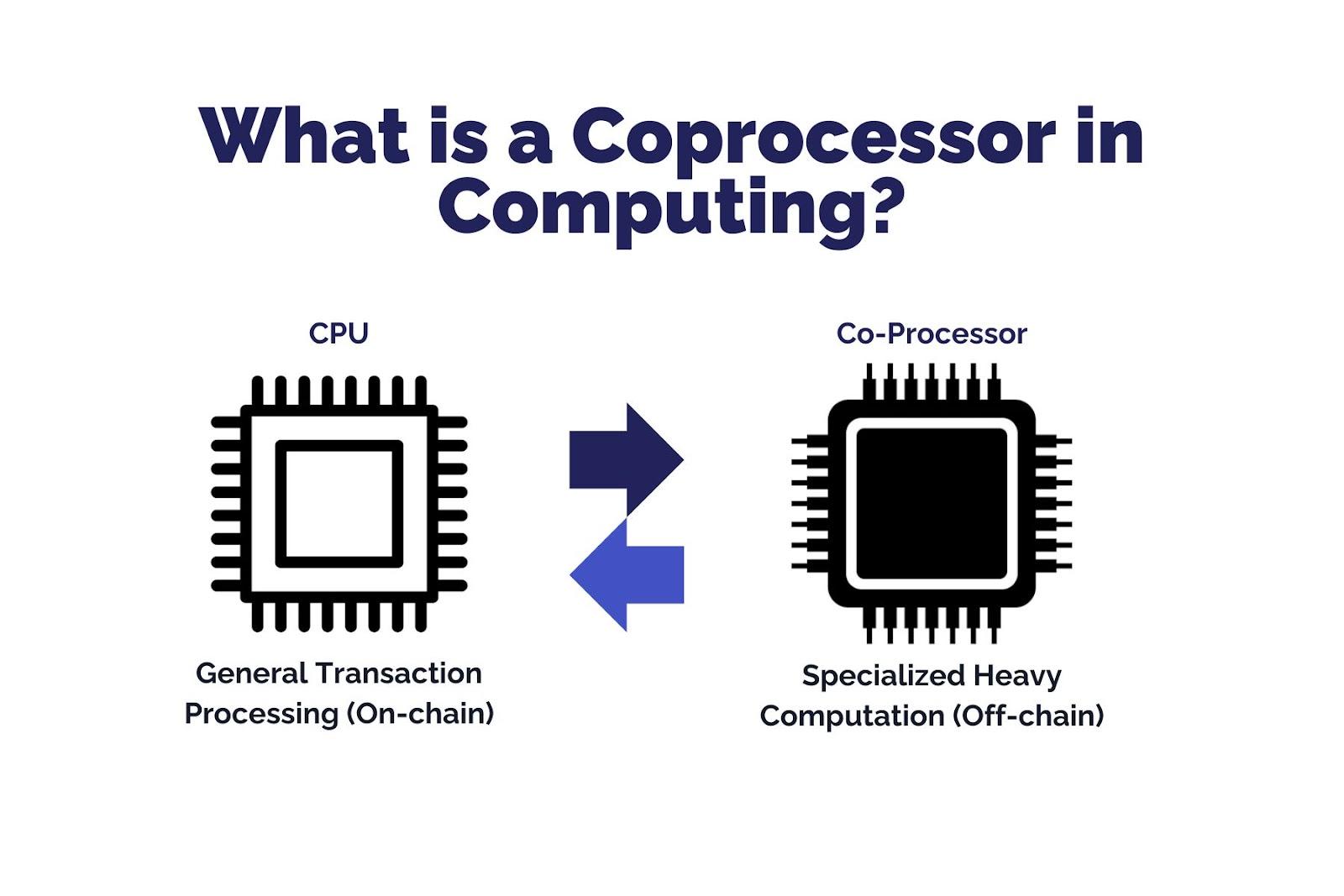Fundamentals of Zero‑Knowledge Coprocessors
Zero‑Knowledge Coprocessors (ZK Coprocessors) represent an emerging layer in blockchain infrastructure designed to offload complex computations from the base chain while maintaining verifiable trust. To understand why they have become an important innovation, it is essential to examine the foundational concepts of coprocessors, the principles of zero‑knowledge proofs, and the challenges they are intended to solve in modern blockchain ecosystems.
What is a Coprocessor in Computing?

In traditional computing, a coprocessor is a secondary processor that performs specialized tasks alongside the central processing unit (CPU). Historically, coprocessors were introduced to handle functions such as floating-point arithmetic or graphics rendering, enabling the CPU to focus on general-purpose operations. This architectural division reduced computational load on the primary processor and allowed more efficient handling of resource‑intensive tasks.
The same idea has been adapted to blockchain environments, where on‑chain computation is inherently costly and constrained by gas limits or block size. A blockchain’s primary execution layer functions like the CPU: it processes transactions, updates state, and enforces consensus rules. A coprocessor, in this context, operates off‑chain to perform heavy calculations and then produces a verifiable proof of the result that can be checked by the base chain. This model allows blockchains to maintain security while accessing far greater computational throughput.
Refresher on Zero‑Knowledge Proofs
Zero‑Knowledge Proofs (ZKPs) are cryptographic techniques that allow one party, known as the prover, to convince another party, known as the verifier, that a statement is true without revealing any additional information beyond the truth of the statement itself. Three core properties define a zero‑knowledge proof: completeness, soundness, and zero‑knowledge. Completeness ensures that if the statement is true, an honest prover can always convince the verifier. Soundness ensures that if the statement is false, no prover can convince the verifier except with negligible probability. The zero‑knowledge property guarantees that the verifier learns nothing about the underlying information except its validity.
Several ZKP constructions are widely used today, including zk‑SNARKs (Succinct Non‑Interactive Arguments of Knowledge) and zk‑STARKs (Scalable Transparent ARguments of Knowledge). SNARKs offer compact proof sizes and fast verification, but they often require a trusted setup phase. STARKs remove the trusted setup and provide post‑quantum security, though proofs are generally larger. Both approaches have been instrumental in scaling blockchains and enabling privacy‑preserving applications.
Defining Zero‑Knowledge Coprocessors
A Zero‑Knowledge Coprocessor combines the principles of coprocessing and zero‑knowledge proofs to create an off‑chain computation engine that outputs verifiable results to the blockchain. Rather than executing all logic on‑chain, which can be prohibitively expensive, the system delegates complex operations to the coprocessor. Once the computation is completed, the coprocessor generates a cryptographic proof attesting that the result is correct. The blockchain then verifies this proof without re‑executing the computation itself.
This model enables blockchains to perform tasks that are computationally intensive or data‑heavy, such as large‑scale data analytics, privacy‑preserving machine learning, or cross‑chain verification, without sacrificing security or decentralization. In essence, ZK Coprocessors extend the capabilities of blockchain networks while keeping the trust guarantees that make them secure.
Why ZK Coprocessors Are Needed
The growing complexity of decentralized applications has exposed limitations in existing blockchain architectures. Smart contracts on layer‑1 networks like Ethereum are constrained by high gas costs and limited throughput, which makes advanced computations impractical. Even layer‑2 rollups, while improving scalability, primarily optimize transaction batching and do not solve the challenge of executing resource‑intensive logic.
ZK Coprocessors address this problem by moving computation off‑chain while retaining verifiable trust. For example, querying historical blockchain data or performing cryptographic transformations on large datasets can be computationally prohibitive if done entirely on‑chain. By using a coprocessor, developers can perform these tasks off‑chain and submit succinct proofs to the base chain, significantly reducing costs and latency.
Another key motivation is privacy. Traditional blockchain computation is public by default, exposing input data and intermediate states to anyone observing the network. Zero‑Knowledge Coprocessors can execute private computations where sensitive inputs, such as personal identifiers or proprietary algorithms, remain hidden while still producing a proof of correctness. This property is increasingly relevant in regulated industries and enterprise use cases where confidentiality is critical.
Position in Blockchain Architecture
ZK Coprocessors occupy a distinct position within the modular blockchain paradigm. Unlike zk‑rollups, which primarily use zero‑knowledge proofs to compress transaction data and provide scalability, ZK Coprocessors are designed to handle arbitrary off‑chain computations that may not directly involve transaction batching. They serve as a complementary layer rather than a replacement for rollups or other scaling solutions.
In a typical architecture, the base chain (layer 1) handles consensus and minimal verification logic. Layer‑2 solutions provide scalable execution for general smart contract activity. The ZK Coprocessor operates alongside these layers, performing specialized computations such as data analysis, cryptographic operations, or verifiable off‑chain logic. Proofs generated by the coprocessor can be submitted to either the layer‑1 or layer‑2 chain, depending on the application’s requirements.
This architecture represents a shift toward modularity, where different components of blockchain infrastructure specialize in specific tasks and communicate through proofs. As more applications demand verifiable interactions with external data or high‑throughput computation, ZK Coprocessors are positioned to become a key enabler of advanced decentralized systems.





